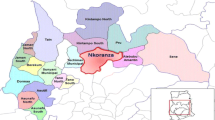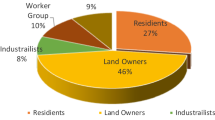Abstract
For the first time, South Africa has a single national piece of legislation, the Spatial Planning and Land Use Management Act, 2013, that creates an overarching framework for spatial planning, policy and land use management for the entire country, including rural and informal settlements. Spatial plans linked to zoning schemes are at the heart of this planning system. However, zoning as a land use management tool has been intensely criticised as being exclusionary and socially, economically and environmentally unsustainable. Given that the purpose of the new legislation is to create equitable and sustainable development, this paper questions whether zoning is indeed the most suitable land use management tool in South Africa. The paper briefly outlines the requirements of the new act and then evaluates the usefulness of various forms of land use management such as land use zoning, performance zoning, form-based control and discretionary systems in the South African context. Drawing on the strengths of some of the alternative land use management systems, proposals are made for a more suitable land use management system for South Africa that could have applicability in other countries with a similar colonial history.
Similar content being viewed by others
References
Ahern, J. (2011). From fail-safe to safe-to-fail: sustainability and resilience in the new urban world. Landscape and Urban Planning, 100, 341–343. doi:10.1016/j.landurbplan.2011.02.021.
Baker, D. C., Sipe, N. G., & Gleeson, B. J. (2006). Performance-based planning: perspectives from the United States, Australia, and New Zealand. Journal of Planning Education and Research, 25, 396–409.
Ben-Joseph, E. (2005). The code of the city: Standards and the hidden language of place-making. Cambridge: MIT.
Booth, P. (2009). Managing land-use change. Land Use Policy, 26S, S154–S159.
Buitelaar, E. (2009). Zoning, more than just a tool: explaining Houston's regulatory practice. European Planning Studies, 17(7), 1049–1065. doi:10.1080/09654310902949588.
Centre for Applied Transect Studies. (n.d.). SmartCode (Version 9.2) available from http://transect.org/codes.html Accessed 9 December 2014.
Charlton, S. (2008). The state of land use management in South Africa. A report as part of the Inequality and Marginalisation theme prepared for Urban Landmark and Trade and Industrial Strategies (TIPS). Available from http://www.tips.org.za/files/u65/land_use_management_-_charlton.pdf. Accessed 1 November 2014.
City of Johannesburg. (2009). Amendment Scheme 9999 Local authority notice 1053, Provincial Gazette 24 June 2009.
Connor, S. M. (1981). Performance zoning: successor to Euclidian zoning? Land Use Law and Zoning Digest, 33(1), 7–10.
Coyle, S. (2011). Sustainable and resilient communities: a comprehensive action plan for towns, cities and regions. Hoboken: Wiley.
De Beer, S. (2014). Lifestyle estate evolution in South Africa: implications for financial viability and environmental sustainability. Unpublished Honours dissertation in Urban and Regional Planning, University of the Witwatersrand.
Department of Cooperative Governance and Traditional Affairs (COGTA). (2014). Back to basics. http://www.cogta.gov.za/summit2014/wp-content/uploads/2014/10/plgsummit-backtobasics-discussion-document.pdf. Accessed 7 August 2015.
Department of Environmental Affairs. (2010). South African Manual for Outdoor Advertising Control. Available from https://www.environment.gov.za/documents/strategicdocuments?q=content/southafrican_manualfor_outdoor_advertising_control Accessed 8 October 2015
Department of Housing. (1997). Urban Development Framework. Pretoria: Governemnt Printer.
Duany, A., & Talen, E. (2001). Making the good easy: the smart code alternative. Fordham Urban Law Journal, 29(4), 1445–1468.
Dubezane, M. (2015). Evaluating the role of traditional leaders in land use management: a case study of Mahlayizeni Traditional Council in Nkandla Local Municipality. Unpublished Masters dissertation. University of the Free State.
Eggers, W.D. (1990). Land use reform through performance zoning. Online: http://heartland.org/sites/all/modules/custom/heartland_migration/files/pdfs/5458.pdf accessed 1 December 2014.
Fischel, W. A. (2004). An economic history of zoning and a cure for its exclusionary effects. Urban Studies, 41, 317–340.
Glaeser, E. L. (2011). Triumph of the city. New York: Penguin.
Görgens, T., & Denoon-Stevens, S. (2013). Towards facilitative and pro-poor land use management in South African urban areas: learning from international experience. Urban Forum, 24, 85–103.
Hall, P. (2002). Cities of tomorrow. Oxford: Blackwell.
Harris, N. (2010). Discretion and expediency in the enforcement of planning controls. Town Planning Review, 81(6), 675–700.
Harrison, P. (2014). Regional and spatial development background paper for 20 year review. South Africa: The Presidency, Pretoria.
Harrison, P., & Todes, A. (2015). Spatial transformations in a “loosening state”: South Africa in a comparative perspective. Geoforum, 61, 148–162.
Harrison, P., Todes, A., & Watson, V. (2008). Planning and transformation: learning from the post-apartheid experience. London: Routledge.
Healey, P. (2010). Making better places: the planning project in the twenty-first century. Basingstoke: Palgrave McMillan.
Hirt, S. (2012). Mixed use by default: how the Europeans (don't) zone. Journal of Planning Literature, 27, 375–393.
Hirt, S. (2013a). Home, sweet home: American residential zoning in comparative perspective. Journal of Planning Education and Research, 33, 292–309.
Hirt, S. (2013b). Form follows function? How America zones. Planning Practice and Research, 28(2), 204–230.
Hirt, S. A. (2014). Zoned in the USA: the origins and implications of American land use regulation. Ithaca: Cornell University Press.
Huchzermeyer, M. (2011). Cities with ‘slums’: From informal settlement eradication to a right to the city in Africa. Cape Town: UCT Press.
Jacobs, J. (1961). Death and life of great American cities. New York: Modern Library.
Jaffe, M. (1993). Performance zoning: a reassessment. Land Use Law & Zoning Digest, 45(3), 3–9. doi:10.1080/00947598.1993.10395790.
Knaap, G., Meck, S., Moore, T., & Parker, R. (2007). Do we know regulatory barriers when we see them? An exploration using zoning and development indicators. Housing Policy Debate, 18(4), 711–749. doi:10.1080/10511482.2007.9521619.
Lloyd, M. G., & Peel, D. (2007). Shaping and designing model policies for land use planning. Land Use Policy, 24, 154–164.
Mbense, L. (2015). Land use management in an African context: the case study of Vulindlela area within Msunduzi Municipality in KwaZulu Natal Province. Unpublished Masters Dissertation. University of the Free State.
Municipal Demarcation Board (MDB). (2012). State of municipal capacity assessment 2010/2011. www.demarcation.org.za/index.php/capacity-assessment.
National Planning Commission. (2011). Diagnostic overview. Available from http://www.gov.za/sites/www.gov.za/files/npc_diagnostic_overview.pdf. Accessed 25 November 2011.
Nel, V. (2011). Provincial land use legislative reform free state province: status report. Report prepared for SA Cities Network, Johannesburg. Available from acitiesnetwork.co.za/wp-content/uploads/2014/06/provinical_land_use_legislative_reform_-free_state-_-_september_2011.pdf
Ohm, B. W., & Sitowski, R. J. (2003). The influence of New Urbanism on local ordinances: the twilight of zoning? The Urban Lawyer, 35(4), 783–794.
Oranje, M. (1995). The need for an appropriate system of urban development control in South Africa: arguments and characteristics. Town and Regional Planning, 39, 22–33.
Oranje, M. (2014). Back to where it all began …? Reflections on injecting the (spiritual) ethos of the Early Town Planning Movement into Planning, Planners and Plans in post-1994 South Africa. HTS Teologiese Studies/Theological Studies, 70(3), Art. #2781, 10 pages. doi: 10.4102/hts.v70i3.2781.
Page, S. E. (2011). Diversity and complexity. Princeton: Princeton University Press.
Parnell, S., & Pieterse, E. (2010). The ‘right to the city’: institutional imperatives of a developmental state. International Journal of Urban and Regional Research, 34(1), 146–162.
Qain, Z. (2010). Without zoning: urban development and land use controls in Houston. Cities, 27, 31–41.
Rodriguez, R. (2005). The foundational process of cities in Spanish America: the law of Indies as a planning tool for urbanization in early colonial towns in Venezuela. Focus, 2(1), 13. Available at: http://digitalcommons.calpoly.edu/focus/vol2/iss1/13.
Sekonyela, S. (2014). Land use management systems in rural areas: the case of Thaba Nchu villages. Unpublished Masters Dissertation. University of the Free State.
Silver, C. (1997). The racial origins of zoning in American cities. In J. Manning Thomas & R. Marsha (Eds.), Urban planning and the African American community: in the shadows. Thousand Oaks: Sage Publications. Available from: http://racialequitytools.org/resourcefiles/silverracialoriginsofzoning.pdf. Accessed 8 December 2014.
South Africa. (2013). Spatial planning and land use management Act, 16 of 2013 (SPLUMA). Pretoria: Government Printer.
Sowetanlive. (2015). Traditional leaders vow to defy government over new land law. http://www.sowetanlive.co.za/news/2015/07/04/traditional-leaders-vow-to-defy-government-over-new-land-law. Accessed 6 July 2015.
Steedley, A. (2014). Understanding affordable housing markets: overview report. Centre for Affordable Housing Finance in Africa. http://www.housingfinanceafrica.org/document/understanding-affordable-housing-markets-overview-report. Accessed 25 June 2015.
Swilling, M. (2011). Reconceptualising urbanism, ecology and networked infrastructures. Social Dynamics: A journal of African studies, 37(1), 78–95. doi:10.1080/02533952.2011.569997.
Talen, E. (2002a). Help for urban planning: the transect strategy. Journal of Urban Design, 7(3), 293–312. doi:10.1080/1357480022000039349.
Talen, E. (2002b). The social goals of new urbanism. Housing Policy Debate, 13(1), 165–188.
Talen, E. (2006). Design that enables diversity: the complications of a planning ideal. Journal of Planning Literature, 20(3), 233–249. doi:10.1177/0885412205283104.
Talen, E. (2008). Design for diversity: exploring socially mixed neighborhoods. Oxford: Architectural Press.
Talen, E. (2009). Design by the rules: the historical underpinnings of form-based codes. Journal of the American Planning Association, 75(2), 144–160.
Talen, E. (2012a). City rules: How regulations affect urban form. Washington DC: Island Press.
Talen, E. (2012b). Zoning and diversity in historical perspective. Journal of Planning History, 11, 330–347.
Talen, E. (2013). Zoning for and against sprawl: the case for form-based codes. Journal of Urban Design, 18(2), 175–200.
Tarlock, A. D. (2014). Zoned not planned. Planning Theory, 13, 99–111.
The Presidency. (2014). 20 Year Review Background paper: Local government. The Presidency. Available from http://www.thepresidency-dpme.gov.za/publications/20%20Years%20Review/20%20Year%20Review%20Documents/20YR%20Local%20Government.pdf. Accessed 14 June 2015.
Thomas, K. (1997). Development control: principles and practices. London: Routledge.
Todes, A. (2012). Urban growth and strategic spatial planning in Johannesburg, South Africa. Cities, 29, 158–165.
Todes, A., Karam, A., Klug, N., & Malaza, N. (2010). Beyond master planning? New approaches to spatial planning in Ekurhuleni, South Africa. Habitat International, 34, 414–420.
Van Wyk, J. (2012). Planning law. Cape Town: Juta.
Van Wyk, J., & Oranje, M. (2014). The post 1994 South African spatial planning system and bill of rights: a meaningful and mutually beneficial fit? Planning Theory, 13, 349–369.
Watson, V. (1993). The need for more appropriate forms of urban management: the case of land use controls and home businesses. Development Southern Africa, 10(2), 155–166. doi:10.1080/03768359308439680.
Watson, V. (2009). Seeing from the South: refocusing urban planning on the globe's central urban issues. Urban Studies, 46, 2259–2275.
Wilkinson, C. (2012). Social-ecological resilience: insights and issues for planning theory. Planning Theory, 11, 148–169. doi:10.1177/1473095211426274.
Williams, A.D. (2013). Land use management principles for people centred developmental governance in the rural context of the Eastern Cape Province. Unpublished Master’s dissertation. University of the Free State.
Author information
Authors and Affiliations
Corresponding author
Rights and permissions
About this article
Cite this article
Nel, V. Spluma, Zoning and Effective Land Use Management in South Africa. Urban Forum 27, 79–92 (2016). https://doi.org/10.1007/s12132-015-9265-5
Published:
Issue Date:
DOI: https://doi.org/10.1007/s12132-015-9265-5




